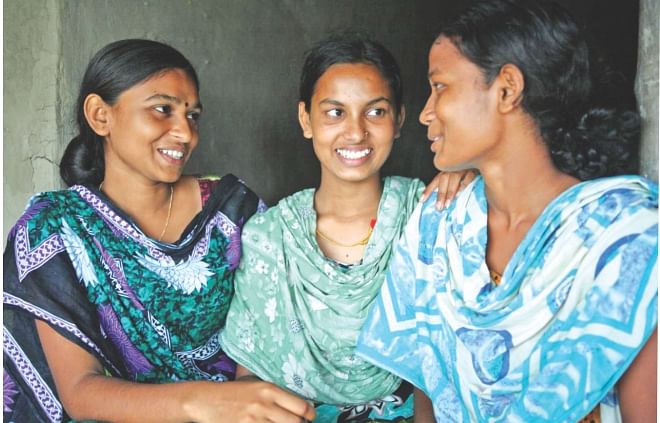Adolescent cyclone survivor turns into social change agent

Dacope, Khulna: Deepti Mondol (real name not revealed to protect privacy) has led anything but a sheltered life. At the age of 12, Deepti spent the better part of several hours perched precariously on a tree branch while the rain beat down on her back.
“It felt like painful rocks were being pelted at my back,” says Deepti.
Tropical Hurricane Aila caused mass devastation to southwestern Sunderbans, in the Dacope upazila (sub-district) of Bangladesh in 2009. During the storm, Deepti miraculously found a tree to climb up and hold on to, and hence save herself in heavily deforested Dacope. Not all of her family members were so lucky: her only maternal uncle, Nayan, died during the storm.
To add to this, the Dhaki river banks eroded extensively, ensuring the family home could never be fully recovered to its pre-storm state that it was before. Where the family house once lay, there was now a widened and raging river that refused to retreat.
Deepti and her family are among thousands of people who spent 17 months living in makeshift shacks on the river's edge. The possibility of schooling there was impossible, and in order to reduce the family's costs, Deepti's marriage to a man 20 years her senior was arranged when she was just 13.
In Bangladesh, approximately 68 percent of women aged between 18 and 45 are married before 18, and in rural areas such as Dacope, these numbers are even higher.
Deepti's mother, Malati, says, “Sometimes, I think that even Aila was a blessing because after Aila, people from outside the community came and assessed our problems and addressed the issue of child marriage. It's really important for me that I had this support, because it was easier to say no to proposals, because being married young leads to several problems in a girl's life.”
“Now, after learning about the harmful mental and physical strains on a girl if she is married too young, I am really glad that I have the training to challenge this harmful practice. I am also proud that our group of Kishor-Kishori (adolescent) leaders has already stopped six child marriages this year alone,” says Deepti.
The Kishori Abhijan, or the Adolescent Empowerment project, aims to enable adolescents, especially but not exclusively girls, to participate meaningfully in decisions that affect their lives.
“I am not going to get married till I am 18,” she announces proudly. “I used to wonder how I would even study if my school is under water, but now I have learnt so many lessons that I am eager to teach my friends and community members about how we can all help ourselves address the problems of poverty, because it affects us all, regardless of age.”

 For all latest news, follow The Daily Star's Google News channel.
For all latest news, follow The Daily Star's Google News channel. 



Comments